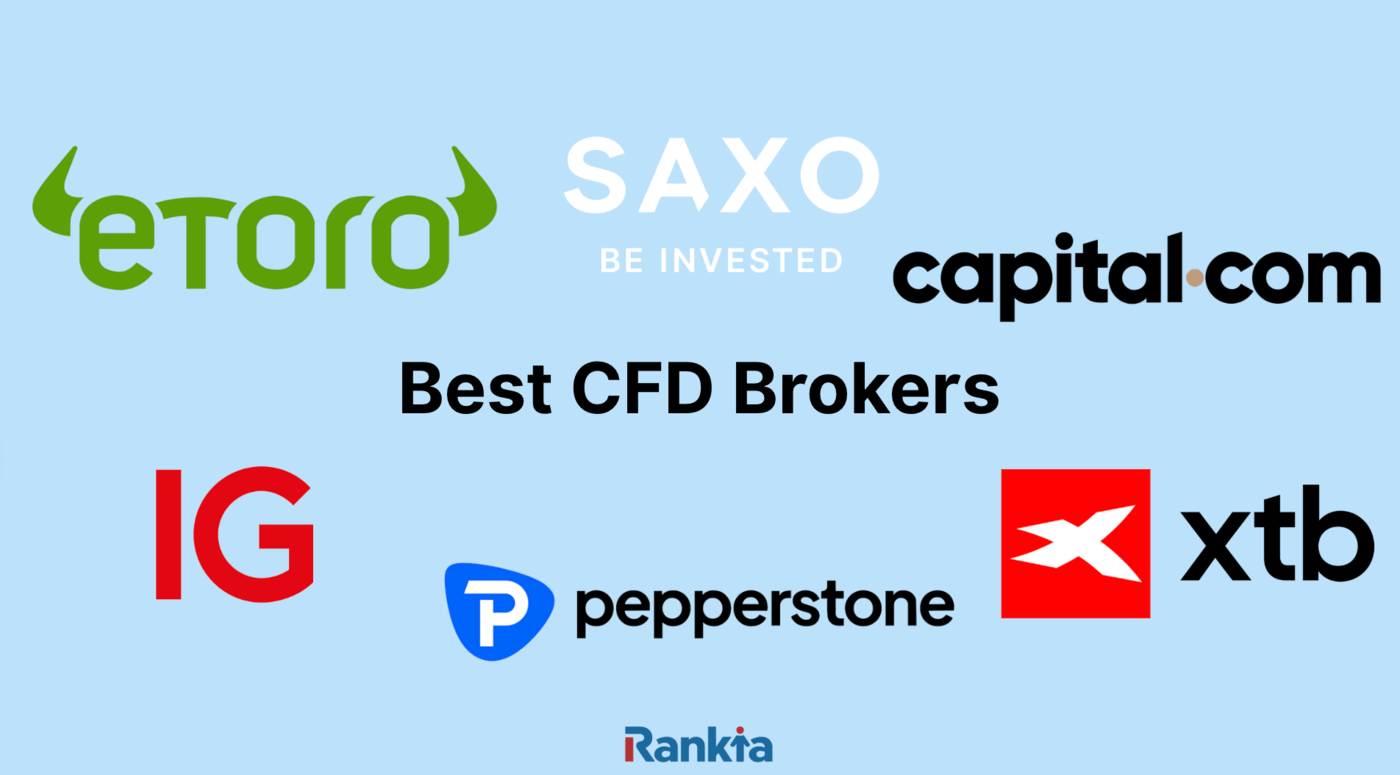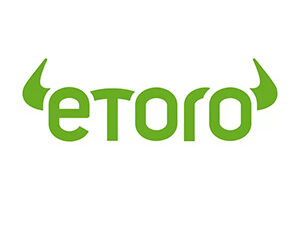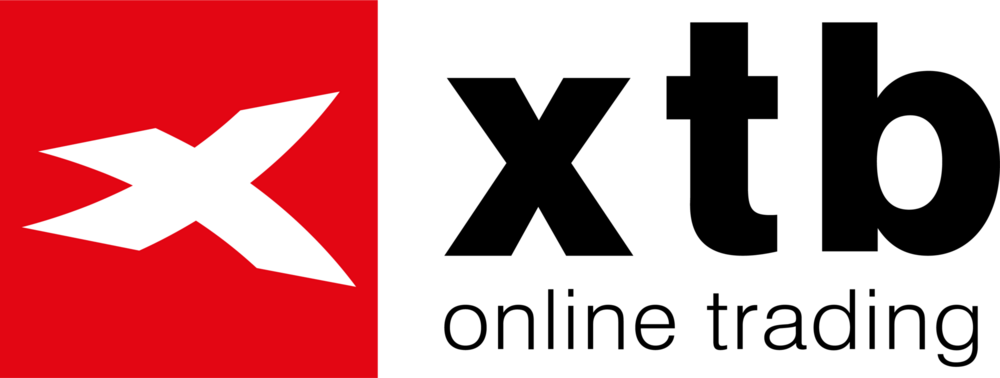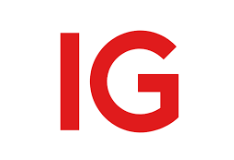Best brokers
Best CFD brokers in the UK

Contracts for difference (CFDs) are financial instruments increasingly popular with traders in the UK, offering a flexible way to invest in shares, indices, commodities, and cryptocurrencies. Choosing the best CFD broker can significantly impact costs, security, and the platforms available.
In this 2025 guide, we review the top CFD brokers, comparing their features, benefits, and fees.
The best CFD brokers in the UK
Contracts for difference (CFDs) are agreements where the profit or loss comes from the difference between the purchase and sale price.
CFDs are derivative financial instruments that let traders benefit from the price movements of an asset without actually owning it. The level of profit or loss depends on factors such as:
- the spread (the difference between the bid and ask price),
- overnight fees,
- broker commissions.
An important feature not to overlook is leverage. While it can amplify gains, leverage also involves costs that are often underestimated—costs that can be the difference between making a small profit or incurring a loss.
Before we begin, here is a summary table highlighting the key features of the best CFD brokers for 2025.
Comparison of the best CFD brokers
| Broker | Products tradable with CFD | Minimum Deposit | Platform | ||||
| Capital.com | Indices, forex, stocks, commodities and cryptocurrencies. | 20 GBP | Own and App MetaTrader 4 | ||||
| eToro | Forex, stocks, commodities, indices, ETFs, cryptocurrencies. | 10 USD | eToro proprietary | ||||
| XTB | Forex, indices, commodities, stocks, ETFs, crypto and stocks. | 0 USD | xStation | ||||
| IG | Stocks, indicies, forex, commodities, ETFs, cryptocurrencies. | 0 GBP | Web platform, TradingView, MetaTrader 4, ProRealTime | ||||
| Pepperstone | Forex, CFDs and cryptocurrencies. | 0 USD | MT4 and MT5, TradingView, cTrader | ||||
| Saxo | Indices, stocks, ETFs, commodities, bonds. | 0 USD | SaxoTraderGO |
| Broker | Products tradable with CFD | Minimum Deposit | Platform |
| Capital.com | Indices, forex, stocks, commodities and cryptocurrencies. | 20 GBP | Own and App MetaTrader 4 |
| eToro | Forex, stocks, commodities, indices, ETFs, cryptocurrencies. | 10 USD | eToro proprietary |
| XTB | Forex, indices, commodities, stocks, ETFs, crypto and stocks. | 0 USD | xStation |
| IG | Stocks, indicies, forex, commodities, ETFs, cryptocurrencies. | 0 GBP | Web platform, TradingView, MetaTrader 4, ProRealTime |
| Pepperstone | Forex, CFDs and cryptocurrencies. | 0 USD | MT4 and MT5, TradingView, cTrader |
| Saxo | Indices, stocks, ETFs, commodities, bonds. | 0 USD | SaxoTraderGO |
Capital.com
Capital.com is a global broker specialising in CFD (Contracts for Difference) trading, founded in 2016. Thanks to its intuitive platform and the wide range of financial instruments available, it has quickly established itself in the online trading landscape. The security and reliability of Capital.com are guaranteed by regulation from prestigious financial authorities, including: the FCA in the United Kingdom, the Cyprus Securities and Exchange Commission (CySEC), ASIC in Australia, and the Financial Services Authority (FSA) of the Seychelles. This solid regulatory foundation ensures a transparent and protected trading environment for users.

Capital.com provides its clients with several trading platforms to suit different needs: a proprietary platform available in both web and mobile versions; MetaTrader 4 (MT4), one of the most widely used platforms in the industry; and integration with TradingView, allowing traders to benefit from the powerful technical analysis features offered by this platform.
👉 All the questions you may have about the broker can be found here: Capital.com review
eToro
eToro is a highly popular CFD broker thanks to its user-friendly platform, broad range of tools, social trading features, and strong regulatory framework. It offers a wide selection of CFDs on shares, cryptocurrencies, indices, commodities, and more — allowing traders to diversify their portfolios and access multiple markets.

What makes eToro unique is its social-network-style approach. It’s particularly well known for having one of the best copy trading systems, which enables users to share insights with the wider eToro investor community and replicate the strategies and trades of other investors.
- Equities, ETFs, crypto both real and derivatives
- Social trading e copy trading
- User-friendly platform and demo account
61% of investor accounts lose money by trading CFDs with this provider.
👉 Here you can find our review on eToro.
XTB
Among the best CFD brokers we also find XTB. XTB trading offers over 7,500 CFDs at really contained costs, with a leverage of 1:30 and no minimum deposit. It is one of the leading CFD brokers in Europe, offers a free demo account for 30 days and has a huge range of tools available on its xStation platform (which offers spectacular performance and an excellent user experience) and is also widely regulated.

Furthermore, XTB is very loved by the online trading investor community thanks to the wide range of high-quality investment content, which investors can leverage to better understand the markets and assets and make better investment and trading decisions.
👉 For more information read our XTB review.
IG
IG is one of the largest CFD brokers in the market and offers a comprehensive range of products, all available through CFD trading. Traders can access over 17,000 markets, including forex (with more than 80 currency pairs), global indices, commodities, shares, and ETFs. IG also provides a demo account, along with competitive spreads and low commissions.

Headquartered in London, IG is fully regulated by the FCA, offering a high level of security and transparency for UK-based traders. In addition to its robust trading platform, IG provides advanced charting tools, in-depth market analysis, and integration with MetaTrader 4.
👉 To learn more, read our in-depth review of IG.
Pepperstone
On Pepperstone it is possible to trade Forex and a series of CFDs (commodity, stock indices, ETFs, stocks and crypto CFDs).
Among the cryptocurrencies are Bitcoin, Bitcoin Cash, Ethereum, Dogecoin, Litecoin and Polkadot. Speaking of commodities, we really liked the fact that you can have positions in gold with multiple currencies (USD, EUR, AUD, GBP, CHF).

You can also trade more than 600 US stocks as stock CFDs, including large-cap companies like Boeing, Facebook, Apple, Exxon and Alibaba. Finally, it is possible to trade after hours (when earnings are usually published).
The selection of stock CFDs also includes 100 popular UK stocks, a number of German stocks and over 200 Australian stocks. To trade with stock CFDs you need to have MetaTrader 5. To learn more read: Pepperstone reviews.
👉 To find out more information, read our Pepperstone review.
Saxo
Saxo is a well-established broker with decades of experience in global financial markets. Founded in 1992 and headquartered in Copenhagen, it caters to both retail and professional investors across more than 170 countries.

Saxo offers an extensive range of assets and instruments, including forex, stocks, ETFs, bonds, commodities, indices, and cryptocurrencies, all available via CFDs or direct investing. Clients can trade through the intuitive SaxoTraderGOplatform or the more advanced SaxoTraderPRO, designed for active and professional traders.
With a reputation for institutional-grade service, tight spreads, and a strong regulatory framework (FCA-regulated in the UK), Saxo is a trusted name in the industry.
👉 Want to know if Saxo is right for you? Read our full Saxo review.
How to choose the best CFD broker?
To identify the best CFD broker, consider these factors:
- European regulation (e.g. FCA, CySEC)
- Intuitive and professional platform
- Low spreads and commissions
- Training and analysis tools
- Free demo account
Avoid unregulated brokers, the best CFD brokers in the UK always offer fund protection and transparency.
There are dozens of CFD brokers worldwide — but for a discerning investor, most of them may not be suitable. In fact, only a minority truly meet the standards of quality and reliability. To be considered one of the best CFD brokers, a firm must meet a set of key criteria. Let's explore these in more detail below.
Wide range of assets or underlying products
They must offer a wide variety of underlying assets to use with contracts for difference, with the best brokers counting thousands of underlying assets:
- Shares
- ETFs
- Currency pairs
- Indices
- Commodities
- Cryptocurrencies
CFDs are a very convenient way to expose yourself to American ETFs (which is impossible from Europe), or to commodities (through futures or options).
Easy-to-use trading platform
The trading platform is the main working tool of all traders and investors to carry out their operations on the markets.
There is a wide variety of trading platforms: some are owned by the broker and others are independent (and can be used by different brokers). Below, we will classify some based on the type of user (beginner or expert) for whom each of them may be interesting:
- For beginners: some of the most suitable platforms are MetaTrader, Sirix WebTrader or the platforms of some brokers (like xStation by XTB).
- For more advanced users: MetaTrader or xStation can still be a good option, although there are other platforms that offer excellent performance and a wide variety of options, such as cTrader, ProRealTime and TradingView.
Low commissions
More than "low" it would be better to say "none". The brokers that have established themselves as the best in their CFD offer no longer apply commissions for CFD trading. Only the spread. However, it is true that many of them widen the spread by charging investors a hidden commission.
However, it is not only important that the purchase and sale commissions are low or none, but also those for custody, deposit and withdrawal of money.
Financial Leverage
This is one of the key reasons why CFDs exist: they allow traders to gain significant market exposure with a relatively small upfront investment, thanks to financial leverage.
Leverage can be a powerful tool for experienced traders who understand how to manage risk effectively. However, it’s also a double-edged sword — when misused or misunderstood, it can lead to substantial losses as well as gains.
Since the introduction of the ESMA regulations, leverage on CFDs for retail clients in the UK and EU has been capped, depending on the asset class:
- Shares (Equity CFDs): up to 5:1
- Major indices and gold: up to 20:1
- Other commodities: up to 10:1
- Cryptocurrencies: up to 2:1
These limits are designed to protect less experienced investors from excessive risk. That said, professional clients or those trading under non-European regulations may access higher leverage levels — sometimes up to 500:1.
Any reputable CFD broker should offer at least the ESMA-standard leverage caps, and provide clear education and risk warnings about their use.
What are the risks of CFDs?
There are 3 main risks of CFD trading:
- Leverage, as improper use can lead to significant losses—potentially greater than what the investor or trader was initially prepared to risk. For this reason, the European regulatory authority (ESMA) has set maximum leverage limits for brokers operating under its jurisdiction.
- Market gaps, as unexpected events can cause trades to close at unfavourable prices, resulting in losses that exceed what was originally anticipated if the trade fails.
- Broker costs and security are also key considerations:
- Additionally, some brokers operate with low regulatory oversight.
- Some brokers charge high fees through wide spreads (the difference between the market price of an asset and the price at which a trade is executed) and swaps (fees for keeping a position open overnight or over several days). These costs can significantly impact a trader’s overall profit or loss.
FAQs
What is a CFD broker?
A CFD broker is an intermediary that allows you to operate on derivative financial instruments called CFDs, without directly owning the underlying assets.
What is the best CFD broker for beginners?
Capital.com and eToro are ideal for beginners, thanks to simple interfaces, educational material, and demo accounts.
Are CFD brokers regulated?
Yes, the best CFD brokers operate with official licenses from bodies such as FCA, CySEC, ASIC, ensuring safety and transparency.
Can you trade CFDs without commissions?
Some brokers offer competitive spreads and zero commissions on some operations, but it is always important to read the conditions.
Who pays the CFDs?
If the difference is positive the seller pays the buyer, while if the difference is negative the buyer pays the seller. Also read: what are CFDs.
What are the risks of trading CFDs with leverage?
Trading CFDs with leverage can amplify both gains and losses. This means that while it is possible to make a significant profit from a small market movement, there is also the risk of suffering greater losses than the initial investment. Other risks include liquidity risk, margin risk (you may need to deposit additional funds in a short time) and the risk associated with the effect of market volatility.
Disclaimer:
